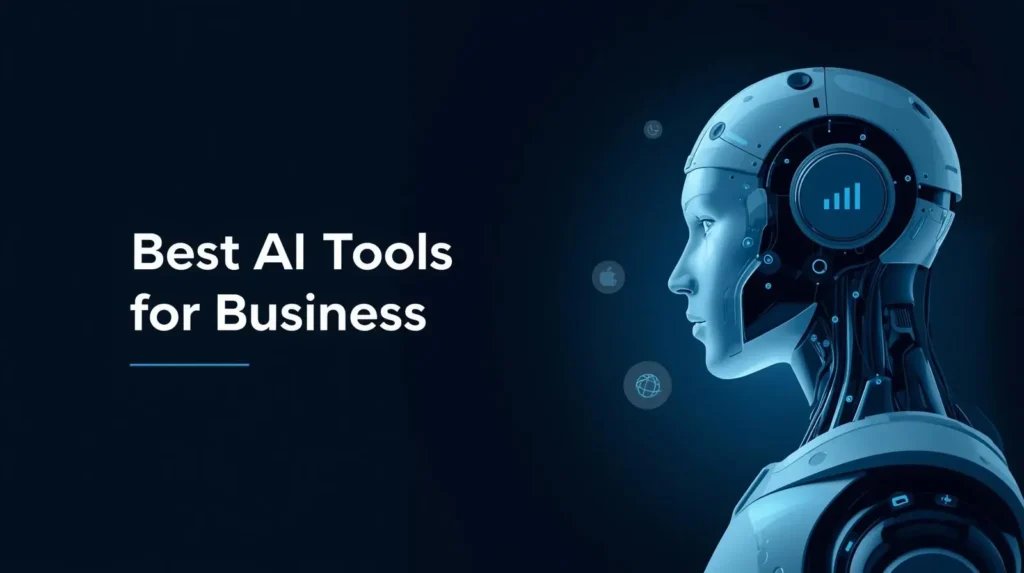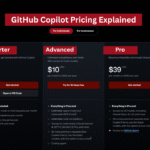Each business owner inevitably hits a limit. Mine occurred precisely at 2:17 AM while managing a client assignment, three outstanding proposals and a content schedule resembling a war zone. My list of tasks seemed endless. My mind utterly exhausted. That night I powered on my laptop not out of interest but out of desperation. Aiming to automate at least a small part of the disorder. That instant led me into an investigation of all AI tools promoted as time-saving solutions, for companies.
According to McKinsey’s research certain tools amazed me with their accuracy. Others upended systems I had honed over many years. A number seemed magical whereas many proved to be ineffective. After months of evaluating over 60 AI platforms, in marketing, sales, content development, workflow automation and analytics I arrived at a straightforward but seldom recognized reality: not all AI tools contribute to growing your business and only a few genuinely enhance your business intelligence.
In this guide, I’m sharing the tools that survived real stress tests — the ones that strengthened my workflows, saved me hours each week, and delivered on what they promised. These are the best AI tools for business, backed by hands-on experience rather than recycled feature lists.
1. The Instrument That Transformed My Workflow: ChatGPT
If I were forced to choose an AI tool to operate my business more effectively ChatGPT would remain my choice.
Here’s how it compares with other major models in my test: ChatGPT vs Google Bard.
When I initially tried ChatGPT for business tasks I didn’t fully appreciate its potential. Most people appeared to utilize it for drafting emails and blog content. However as I began to delve into its advanced functions it turned into an unspoken asset, within the team.
What Surprised Me
ChatGPT produced more, than content.
It arranged workflows, composed contracts, enhanced SEO tactics. Assisted me in practicing negotiation calls, with tailored prompts designed according to client profiles.
One powerful scenario:
I utilized ChatGPT to imitate a client who repeatedly requested changes, beyond the agreed contract terms. I practiced replies and crafted the ideal message to set clear boundaries. The client agreed immediately. No issues all.
Where ChatGPT Works Best
- Training team members quickly
- Drafting internal documents
- Product strategy brainstorming
- Customer support reply templates
- Complex coding help
- Sales follow-ups driven by tone evaluation
Constraints I Discovered
- When not properly directed ChatGPT can assuredly generate information.
- It works well for logic. Is poor, for new data unless you confirm it.
Authoritative guides, for model revisions assist in refining prompts: OpenAI Documentation.
2. Notion AI: The Brain of My Business
I had been using Notion for years prior, to the AI update. It was already quite effective.
However once Notion AI was introduced it transformed into a command hub.
How Notion AI Saved Hours
Notion AI performs a remarkably effective task. It arranges disorder before disorder calls for your focus.
Example from my workflow:
I uploaded a product roadmap containing 40 disorganized bullet points. Notion AI automatically grouped, named and ranked all items within 14 seconds.
It transformed what appeared to be a mind map, into a well-structured strategic plan.
Practical Scenarios
- Automatic summaries of meeting notes
- Task priorities
- Project timeline generation
- Team knowledge base creation
- SOP writing based on loose notes
What Didn’t Work
- It continues to face difficulties, with code segments and highly technical directives.
If your workflow involves creative visuals, I’ve reviewed one of the most effective options here: Best AI Photo Editor with Prompt.
3. Jasper: For Content That Drives Conversions
I utilized Jasper for a client assignment where the primary objective was:
Turn 8 landing pages into conversion machines.
Once Jasper was provided with the brand voice documents and genuine customer insights an intriguing outcome occurred. The tool produced headlines and CTAs that surpassed our copy in the subsequent A/B test.
Unexpected Discovery
Jasper composes text in a manner, from ChatGPT.
It adopts a sales-focused approach. Its models draw inspiration from established marketing psychology principles.
Best Use Cases
- Landing pages
- High converting ad copy
- Email marketing sequences
- Brand voice consistency
Downsides
- Occasionally the templates come across as inflexible unless you manually revise certain parts.
4. Zapier AI: The Invisible Employee
Zapier has been around for a decade.
However Zapier AI entirely changed how I automated tasks.
Real Scenario
A client frequently shared voice messages via WhatsApp containing content suggestions.
Than manually transcribing, arranging and converting them into content frameworks Zapier AI currently performs this task:
Voice Recording → Automatic Transcription → Forward to ChatGPT → Generate Summary → Develop Content Framework → Store, in Notion.
Weekly total manual time conserved: 4.5 hours.
This is the kind of automation that accumulates exponentially.
What Zapier AI Handles Like a Pro
- Lead routing
- Customer Relationship Management enhancements
- Invoice reminders
- Review generation
- Trigger based marketing
Limitation
- The free plan quickly becomes limiting.
5. Google Gemini for Research
Gemini frequently surpasses ChatGPT when I require facts or intricate research overviews.
The Moment Gemini Took Me by Surprise
During the creation of a competitor analysis for a SaaS client I requested summaries of ten product reports, from both ChatGPT and Gemini. ChatGPT delivered text whereas Gemini offered structured analysis, ROI trends and strategic deficiencies.
It seemed as though the tool was doing more, than analyzing data.
It was analyzing business logic.
Best Use Cases
- Industry research
- Market trend understanding
- Data rich summaries
- Technical analysis
Limitation
- Accurate command configuration is necessary to obtain insights.
6. Canva AI: Marketing Team In A Tool
I have been using Canva for years. Ai has made it incredibly efficient.
The Aspect That Astonished Me
Magic Resize plus Magic Write.
A single campaign asset developed for a client was adjusted in size edited and adapted into Instagram, LinkedIn, Pinterest and email materials in, than a minute.
Real Business Advantages
- Instant brand aligned designs
- Videos created by AI
- Product mockups
- Social media scaling
What Doesn’t Work Well
- Developing a brand identity continues to require a human designer.
If you want to explore more technical use cases of AI beyond design, check out How AI is Revolutionizing Web Application Development.
7. Surfer SEO AI: Ranking Assistant
Surfer SEO has turned into my tool, for SEO strategy and enhancement.
Personal Test Result
I had a blog post that remained stuck on page 3, for five months.
Following the use of Surfer’s AI content gap insights and NLP keywords the article reached page 1 within 11 days.
Best Use Cases
- Content outlines optimized for SEO
- Grouping keywords
- On page audit scoring
- SERP gap detection
Weakness
- For writing Surfer might come across as overly rigid.
8. Make.com AI: Advanced Automation Without Coding
Make.com is Zapier for advanced brains.
Although Zapier is ready to use Make.com enables you to create intricate workflows that resemble genuine software.
Case Study
A Shopify shop proprietor desired automated abandoned cart retrieval featuring customized messages.
Make workflow:
User adds item → Exits site → Make retrieves item image → ChatGPT creates customized abandoned cart message → Message delivered through email and WhatsApp.
Recovery rate improved by 19 percent in 30 days.
Places of Application
- Multi step automation
- E commerce personalization
- CRM enrichment
Limitations
- The learning curve is steeper, than that of Zapier.
9. HubSpot AI: Smart CRM Growth
HubSpots AI solutions enable groups to operate like large ones.
Things I Adored
AI driven lead scoring.
A client transitioned to HubSpot AI. Quickly discovered that 27 percent of leads were not sales-ready. These leads were consuming time. Filling up calendar appointments unnecessarily.
The pipeline was cleaned using AI.
Revenue increased.
The amount of time wasted decreased.
Best Use Cases
- Lead qualification
- Email suggestions
- Customer journey mapping
Weak Spot
- HubSpot AI capabilities are accessible, with upgraded plans.
A Comparative Snapshot
Below is a brief table outlining my outcomes:
| Tool | Ideal Use | Weekly Time Saved | Key Advantage |
|---|---|---|---|
| ChatGPT | General tasks | 7 to 10 hours | Flexibility |
| Notion AI | Process optimization | 3 to 5 hours | Structure |
| Jasper | Content creation | 2 to 4 hours | Psychology based writing |
| Zapier AI | Automation | 4 to 6 hours | Business rule activation |
| Gemini | Research | 2 to 3 hours | Data analysis |
| Canva AI | Marketing | 3 to 6 hours | Expansion |
| Surfer SEO | Search engine optimization | 1 to 2 hours | SERP gap analysis |
| Make.com | Personalized automation | 4 hours | Sophisticated workflows |
| HubSpot AI | Sales | Varies | Lead evaluation |
Final Thoughts: Choosing The Best AI Tools For Business
After months of experimenting, deconstructing, examining, and rebuilding workflows with AI, I realized something surprisingly simple: the best AI tools for business are never the ones with the longest feature list. They’re the quiet workers––the tools that take over the tasks you constantly avoid, the ones that drain your energy without adding real value.
When you choose AI tools that genuinely save time, reduce friction, improve decisions, and strengthen your productivity, your entire business begins to operate differently. Processes feel lighter. Bottlenecks disappear. Your attention returns to the work that actually grows the business instead of the work that slows it down.
Think of this guide as your starting point. Test a few tools. Break them. Rebuild your workflow. Craft your own stack based on where you lose the most time or momentum. Let AI absorb the heavy, repetitive work so you can stay focused on strategy, creativity, and progress.
In the end, these truly are the best AI tools for business the ones that help you save time, reduce stress, and grow without running yourself into the ground. I’d love to hear which tools made the biggest impact on your workflow. Share your experiences in the comments and join our Newsletter for more practical guides.
I’m eager to learn about the AI tools you’ve been trying out.
Share in the comments which tool had the impact, on your workflow. For more guides subscribe our Newsletter.
Common Questions About AI Tools for Small Businesses
What are the best AI tools for businesses?
Leading tools encompass ChatGPT Business for efficiency Canva AI for advertising Notion AI for record-keeping Zapier AI for workflow automation Jasper for content creation and QuickBooks AI, for management.
In what ways can AI tools contribute to saving time in business?
AI technologies streamline activities such, as content generation, accounting and lead management enabling teams to concentrate on planning and expansion.
Are AI tools affordable for small businesses?
Indeed. Numerous providers have affordable options allowing small groups to begin without significant financial commitments.
What is the best way to select the AI tool for my business?
Begin by pinpointing an issue experiment, with a single tool that addresses it evaluate the outcomes and then expand progressively.
Is it possible for AI tools, to fully substitute labor?
No. AI supports and speeds up tasks but still requires human oversight for strategy, creativity, and decision-making.



Thanks for sharing. I read many of your blog posts, cool, your blog is very good.
Your article helped me a lot, is there any more related content? Thanks!
Hello lads!
I came across a 153 interesting platform that I think you should visit.
This site is packed with a lot of useful information that you might find helpful.
It has everything you could possibly need, so be sure to give it a visit!
https://dnalyrics.com/2022/09/top-5-digital-marketing-trends-in-2022.html
Additionally don’t neglect, folks, — one at all times can inside this particular article find responses for the most the absolute complicated inquiries. Our team made an effort to explain all of the content in the very understandable way.
Hello friends!
I came across a 153 fantastic website that I think you should explore.
This platform is packed with a lot of useful information that you might find helpful.
It has everything you could possibly need, so be sure to give it a visit!
https://theedp.com/how-to-start-betting-on-22bet/
And don’t overlook, guys, — one at all times can within the piece find answers to the most complicated questions. The authors attempted — lay out all of the information in the most extremely accessible way.